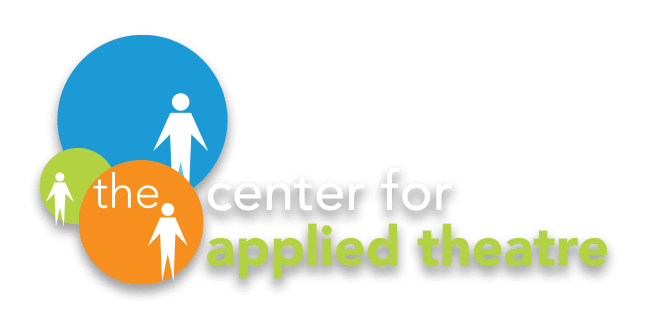Theatre of the Oppressed
The Theatre of the Oppressed (TO) is a participatory theater that fosters democratic and cooperative forms of interaction among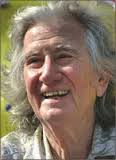 participants. TO invites people to become “spect-actors,” capable of taking action and using theater as a rehearsal space for social transformation. Our workshops employ a variety of processes based on Theatre of the Oppressed, developed by world-renowned theatre-maker, activist, and Nobel Peace Prize nominee, Augusto Boal, to define issues, clarify objectives, build skills, and rehearse practical action.
participants. TO invites people to become “spect-actors,” capable of taking action and using theater as a rehearsal space for social transformation. Our workshops employ a variety of processes based on Theatre of the Oppressed, developed by world-renowned theatre-maker, activist, and Nobel Peace Prize nominee, Augusto Boal, to define issues, clarify objectives, build skills, and rehearse practical action.
Boal believed that “we are all theatre” because, as human beings, we can all act, watch ourselves acting, and based on what we see, change what we do. Changes in our actions can, in turn, change the world around us. Theatre of the Oppressed provides a process for testing actions which can transform the groups, communities, and social systems in which we work and live. It is a rehearsal for change.
Constructive dialogue provides the route to discovery, but words alone limit the scope of discussion and short-circuit the experiences needed to test the impact and practicality of actions. Applied Theatre uses whole-body/whole-mind activities to assist groups to clearly identify problems and actively rehearse solutions. The workshops release potential in individuals while building group cohesion and promoting positive change. Initiating more than just a dialogue, the process frees the thinking of participants and awakens their abilities to move toward agreed upon goals.
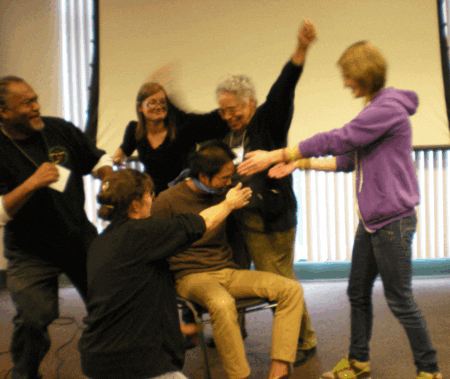 Game playing is one of the core activities of TO. An extensive arsenal of well-crafted and expertly facilitated games allows participants to stretch the limits of their imaginations, demechanize habitual behaviors, develop new responses, and analyze societal structures of power and oppression. Game playing is useful, fun, and builds community!
Game playing is one of the core activities of TO. An extensive arsenal of well-crafted and expertly facilitated games allows participants to stretch the limits of their imaginations, demechanize habitual behaviors, develop new responses, and analyze societal structures of power and oppression. Game playing is useful, fun, and builds community!
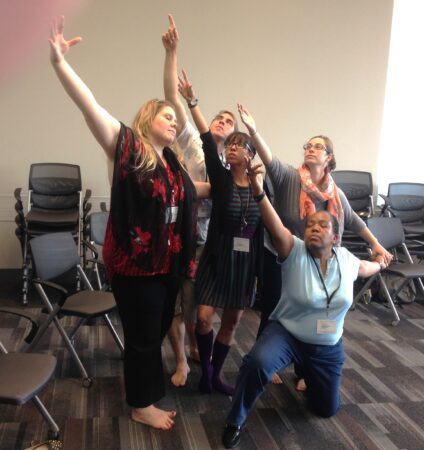 Image Theatre allows participants to explore situations they would like to change and see what positive transformation looks and feels like by sculpting their own and others’ bodies into images of problems and transformation. Images are “dynamized” with words and actions to develop processes for making transformative change.
Image Theatre allows participants to explore situations they would like to change and see what positive transformation looks and feels like by sculpting their own and others’ bodies into images of problems and transformation. Images are “dynamized” with words and actions to develop processes for making transformative change.
Forum Theatre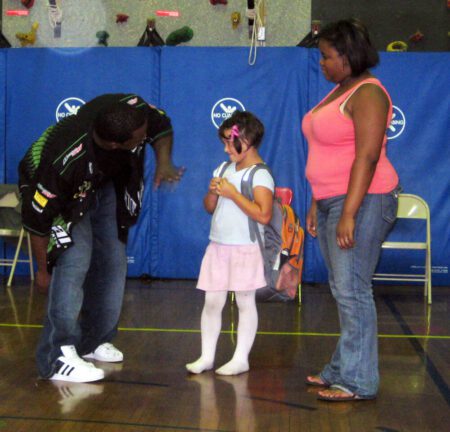 performances present short plays which show an oppressive situation that needs to be changed. Audience members are invited to replace an actor on stage, try to combat (or find allies to help them combat) the system that supports the oppression, and alter the situation. Other actors respond in character, trying to maintain their oppressive or exploitative Interactions are facilitated (Boal liked to call it “difficilitated”) by a Joker – a “wild card” who invites complex questioning about the problem and proposed solutions. In this way Forum Theatre provides a means for testing solutions in action.
performances present short plays which show an oppressive situation that needs to be changed. Audience members are invited to replace an actor on stage, try to combat (or find allies to help them combat) the system that supports the oppression, and alter the situation. Other actors respond in character, trying to maintain their oppressive or exploitative Interactions are facilitated (Boal liked to call it “difficilitated”) by a Joker – a “wild card” who invites complex questioning about the problem and proposed solutions. In this way Forum Theatre provides a means for testing solutions in action.
The spect-actors make and evaluate all choices. As the exploration progresses, it sheds light on the variables that inhibit solutions to reveal the mechanisms of oppression. Forum Theatre uses the artistic perspective and the structural approach of theatre but it becomes a space for discussion and rehearsal of transformative action in the world, rooted in the spect-actors’ collective analysis of shared problems from their multiple social and cultural identities. Forum Theatre has been an important instrument in the fight against oppression and the mobilization of social resistance around the world.
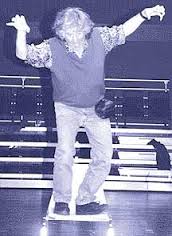 Rainbow of Desire exercises use Image and Forum Theatre to explore oppression that has become internalized as a result of external, social, and systemic pressures. Participants develop an understanding of self-oppression and empathy for themselves and others on the path to self-actualization.
Rainbow of Desire exercises use Image and Forum Theatre to explore oppression that has become internalized as a result of external, social, and systemic pressures. Participants develop an understanding of self-oppression and empathy for themselves and others on the path to self-actualization.
